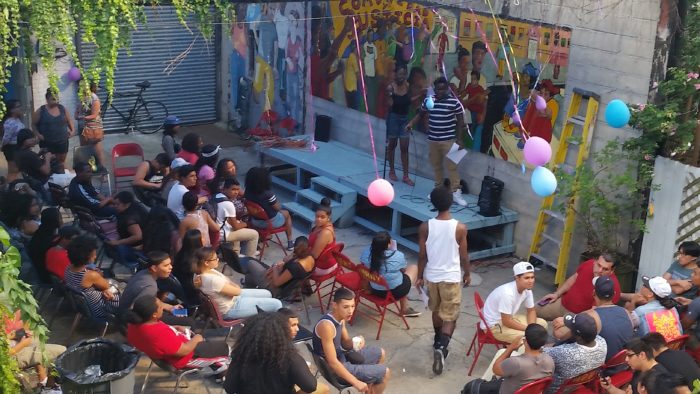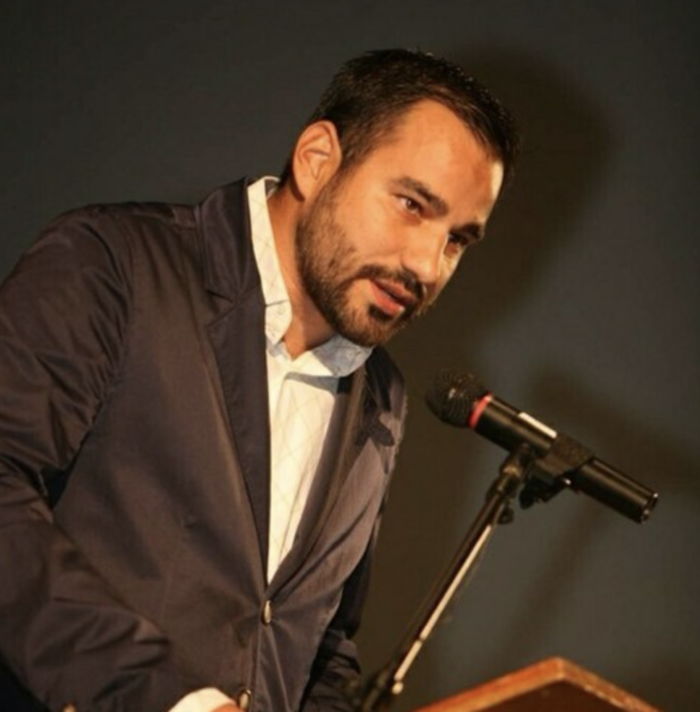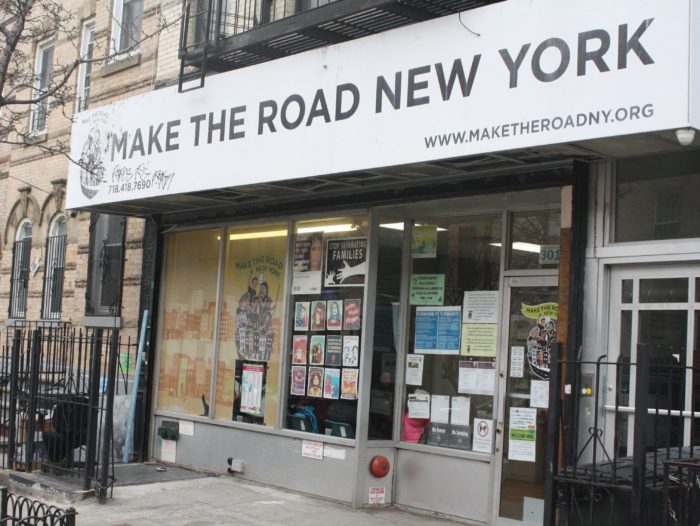Making the Immigrant’s Hard Road a Little Easier
How a Brooklyn-based group sparks rallies, provides vital services, and stands up to Donald Trump
At outdoor gathering at Make the Road's offices in Bushwick (Photo courtesy of Make the Road New York)
On a recent spring evening, the Bushwick offices of Make the Road New York, an immigrant-advocacy organization founded here in 1997, were bustling. That’s by design. When a 20,000-member organization has an open-door policy, the flow of people in and out is constant. That evening the kitchen was clattering with activity as a crew prepared food for a meeting about housing rights and environmental justice. Another group crowded into a youth-development office to plan a spoken-word performance later that night, while a stream of parents arrived for a meeting about the prospect of a nearby public school losing space to a charter.
Titles on Make the Road’s office doors reveal just how impressive the scope of its work is. The organization provides staff for community organizing, leadership development, adult education, legal support and policy advocacy. And with the election of President Donald Trump, the U.S. government’s efforts to crack down on immigration and defund sanctuary cities has given the group’s work a new sense of urgency.
Just after the election, this is where co-executive directors Deborah Axt and Javier Valdés strategized with colleagues on how to harness the surge of interest from New Yorkers wanting to support immigrant rights. The first meeting they scheduled after the election had to be moved outside of the office because the crowd mushroomed to 400 people. Then, after news broke about the President’s travel ban and immigrant detainments, the team swiftly helped organize the widely noted rally at JFK airport, leading a crowd of hundreds with chants like “No ban, no fear, refugees are welcome here.” Soon after, they threw their efforts behind the rally at Battery Park that attracted thousands.
‘Built for This Moment’
For Make the Road, the age of Trump is both a challenge and an opportunity. The group sees its grassroots organizing here in Brooklyn as a powerful tool for influencing the national conversation about immigration. “This organization has been built for this moment,” said Valdés, adding, “We know this is a marathon, not a sprint. We’re preparing to pace ourselves. This is a four-year fight.”
Their fight has been aided by another Brooklyn-based organization, the Brooklyn Community Foundation (BCF). In February, the foundation awarded Make the Road with $100,000 through its first annual Spark Prize. Make the Road was one of five Brooklyn nonprofits selected from over 150 applicants who “are really looking at the deep inequality in our communities and systematic change,” said Liane Stegmaier, the BCF’s director of communications. “These are organizations thinking creatively about how to make our borough a more just and fair place for everyone who lives here.”

Javier Valdés, co-executive director of Make the Road New York (Photo via Twitter)
The prize, Stegmaier said, is a way to support nonprofits that have been investing and organizing in Brooklyn before it became such a pricy, popular destination. “Before the current Brooklyn boom, we’ve had a strong nonprofit community and neighborhood-based organizations that have been part of the resurgence and economic stability of Brooklyn.” Make the Road, she observed, is “probably at the most critical point in its organizational history with the recent changes to the immigration systems in this country.”
Make the Road has had earlier watershed moments, including one that inspired its founding. The group launched in 1997 as Make the Road By Walking to help immigrant welfare recipients going through illegal disruptions to their public benefits in the wake of welfare reform. In 2005 and 2006, major protests erupted in New York’s immigrant community in the face of national legislation that proposed to criminalize many undocumented immigrants. “It was a critical and important moment in our community,” Valdés said. Make the Road By Walking was inspired to “get bigger and stronger” and decided to merge with another organization, the Latin American Integration Center, in 2007 as Make the Road New York.
Expanding Its Reach
This time around, Make the Road looks poised for another step forward as a force in immigration advocacy, thanks in part to its expansion. Make the Road now has offices in three other immigrant-rich neighborhoods: Jackson Heights, Queens; Port Richmond, Staten Island; and Brentwood, Long Island. The group has successfully pushed for pro-immigrant legislation at both the city and state level, including IDNYC cards and a detainer discretion bill.
Make the Road views such victories as crucial in the national fight against Trump’s policies. “We think New York needs to set the tone nationally and try to win proactive victories as it relates to immigration,” Valdés said. In March, the organization won a victory when the mayor announced that ICE agents are not allowed in New York City’s public schools.

The organization’s main office at 301 Grove St. in Bushwick (Photo by Emily Nonko)
One of Make the Road’s new initiatives is to foster a larger army of activists. The group has hired a “leadership development coordinator” to help engage members to “become agents of change,” Valdés said. “Our hope in the next five years is to engage over 6,000 people from our base to have a deeper analysis of the political climate we live in, and also have the tools to help move campaigns and address systemic issues.” Make the Road is also creating “defense committees” to be “as many places as necessary in Brooklyn when immigration agents knock on your door,” Valdés said.
In the Trump era, the organization is balancing its long-term goal–pushing for citizenship for undocumented residents–with more short-term needs, like informing immigrant communities of their rights. Since that first post-election strategy meeting that drew 400, the group has held monthly solidarity meetings open to the public. “Our Brooklyn office is more packed than ever,” Valdés said. “People not only looking for services, but those who want to get engaged.”
“Many people draw a conclusion that immigrant communities are fearful or hiding,” he continued, “But we’ve been able to demonstrate here in Bushwick that the immigrant community–which does have fear and is anxious–is also resilient and is willing to push back and fight back.”










